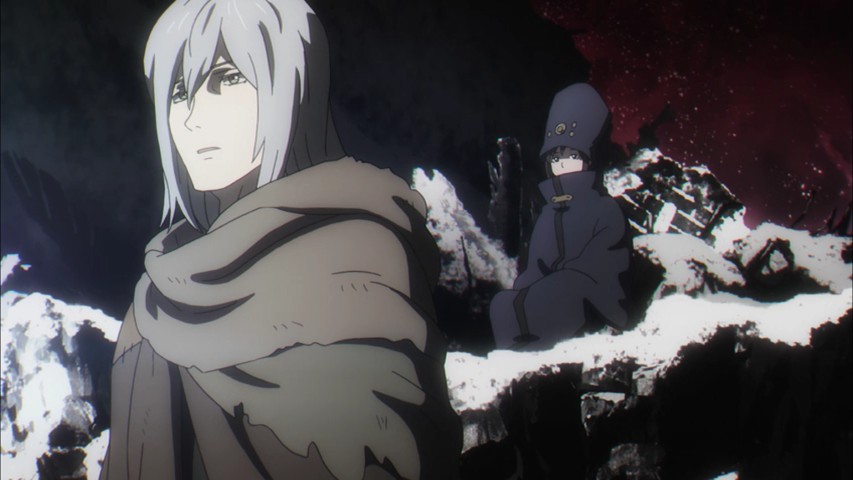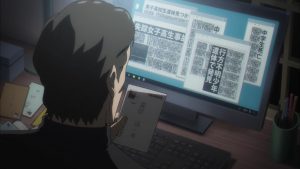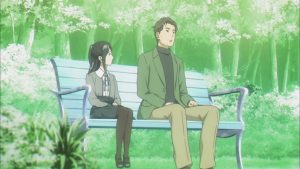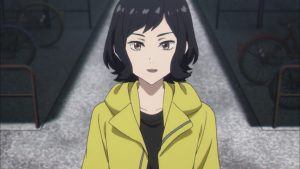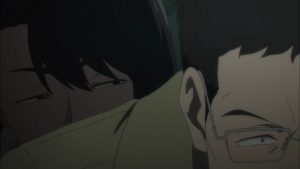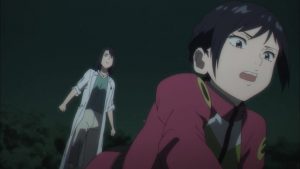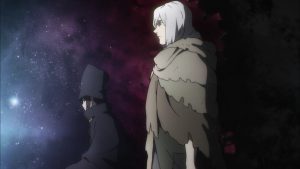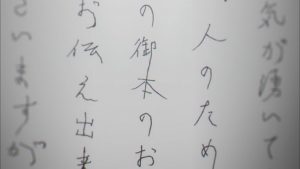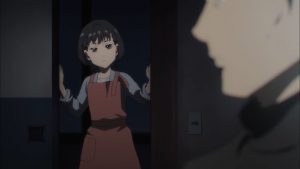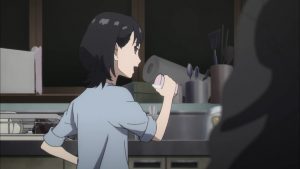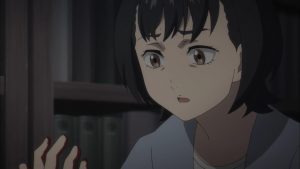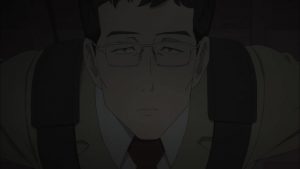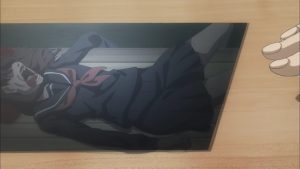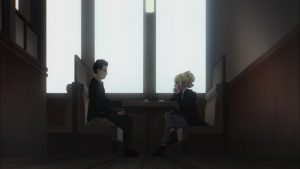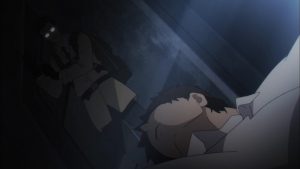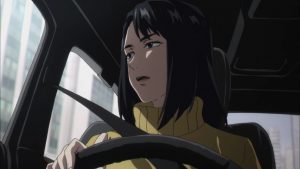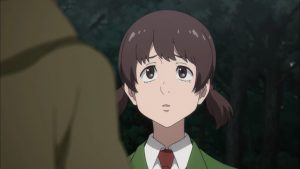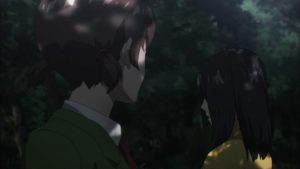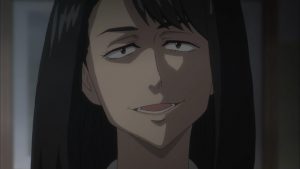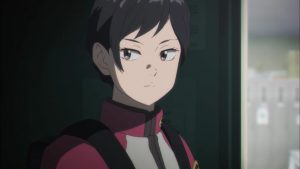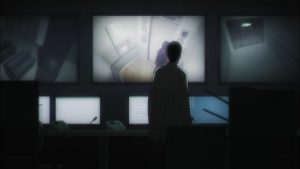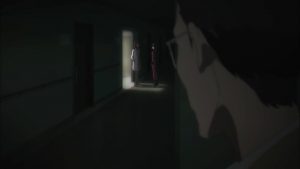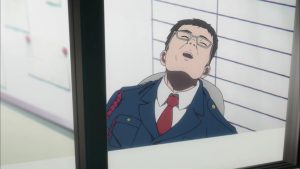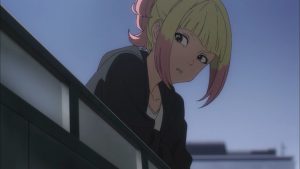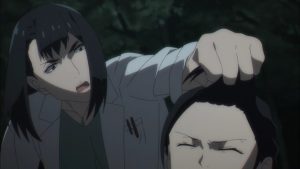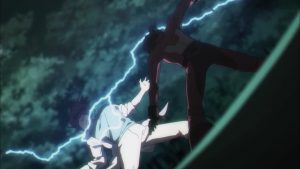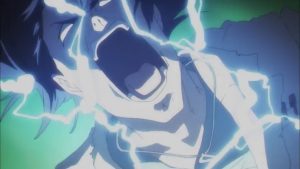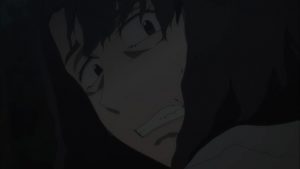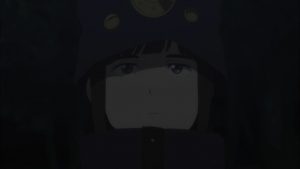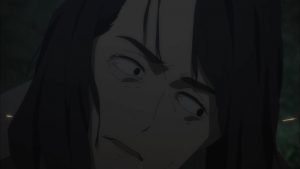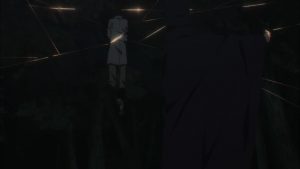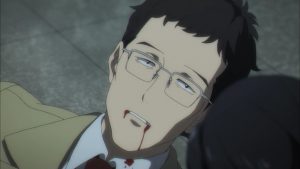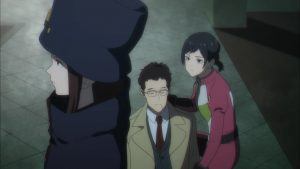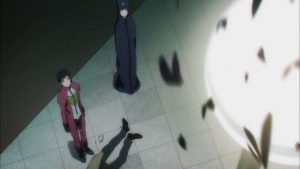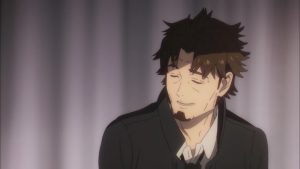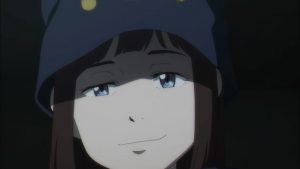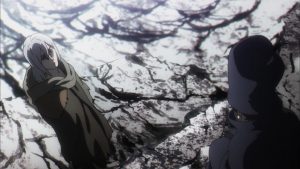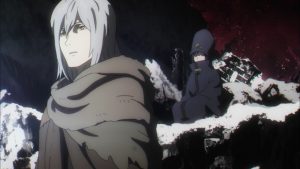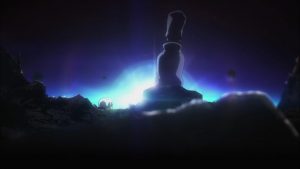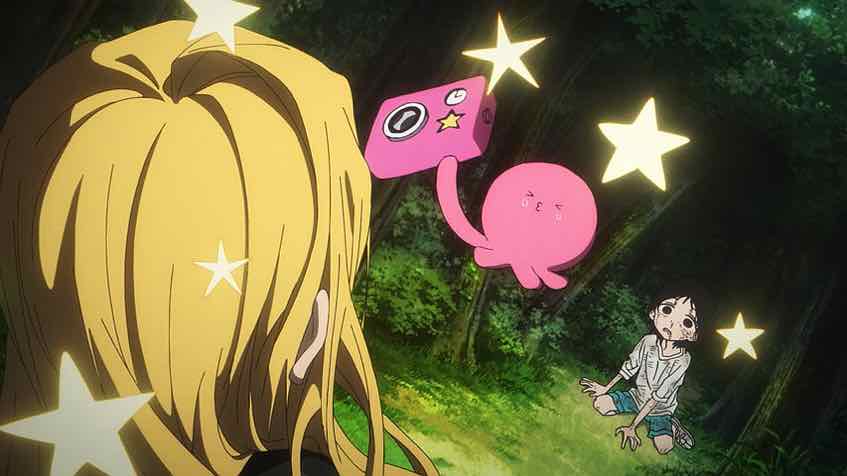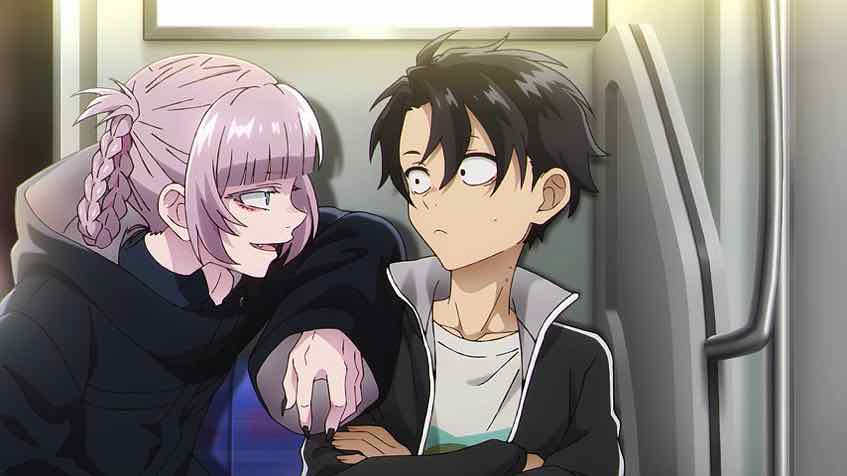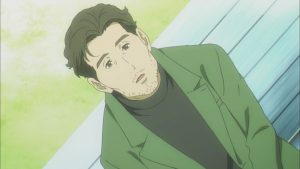 There are pluses and minuses to anime being presented the way the “Boogiepop at Dawn” arc was presented – or even more so, the way Netflix does it. All things being equal I’m not a huge fan of binge viewing, and I prefer my anime weekly on a set schedule (and that works better for the blogger in me, too). But watching four episodes in one sitting – or two over two days, which was the best I could manage – does have an absorptive quality that the traditional approach does not. It works better for some series than it does for others – and I think it works pretty well for a meditative head-piece like Boogiepop wa Warawanai.
There are pluses and minuses to anime being presented the way the “Boogiepop at Dawn” arc was presented – or even more so, the way Netflix does it. All things being equal I’m not a huge fan of binge viewing, and I prefer my anime weekly on a set schedule (and that works better for the blogger in me, too). But watching four episodes in one sitting – or two over two days, which was the best I could manage – does have an absorptive quality that the traditional approach does not. It works better for some series than it does for others – and I think it works pretty well for a meditative head-piece like Boogiepop wa Warawanai.
 Watching this one immediately after “VS Imaginator” was interesting, because they seem to represent the two tonal extremes of this series. “Imaginator” was a much more human and relatable story – I would even venture more “modern” in its narrative approach. “Dawn” strikes me as much more authentic to the core of what this franchise is – it certainly feels more like the other sci-fi anime of its era. I enjoyed them equally, but if I was going to choose one to give a new viewer an idea of what this series is basically like, it would be “Boogiepop at Dawn”.
Watching this one immediately after “VS Imaginator” was interesting, because they seem to represent the two tonal extremes of this series. “Imaginator” was a much more human and relatable story – I would even venture more “modern” in its narrative approach. “Dawn” strikes me as much more authentic to the core of what this franchise is – it certainly feels more like the other sci-fi anime of its era. I enjoyed them equally, but if I was going to choose one to give a new viewer an idea of what this series is basically like, it would be “Boogiepop at Dawn”.
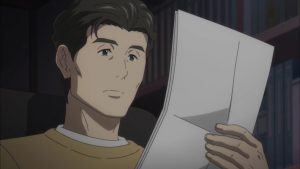 Kadono-sensei is certainly an interesting creative mind. He loves his music references of course (Mo Murder presumably being taken from rapper Krayzie Bone’s mid-90’s hit), he loves to kick around big ideas. He also loves Boogiepop’s idiosyncratic meandering narrative style, showing us the connections between seemingly unrelated events and people. It reminds me of a wonderful old BBC documentary series by science historian James Burke called Connections, which traced historical events through their, well- connections to each other. The idea being, no idea or event can be viewed in a vacuum – each is the result of a chain of decisions taken by people with no idea or even interest in what the ultimate consequences would be.
Kadono-sensei is certainly an interesting creative mind. He loves his music references of course (Mo Murder presumably being taken from rapper Krayzie Bone’s mid-90’s hit), he loves to kick around big ideas. He also loves Boogiepop’s idiosyncratic meandering narrative style, showing us the connections between seemingly unrelated events and people. It reminds me of a wonderful old BBC documentary series by science historian James Burke called Connections, which traced historical events through their, well- connections to each other. The idea being, no idea or event can be viewed in a vacuum – each is the result of a chain of decisions taken by people with no idea or even interest in what the ultimate consequences would be.
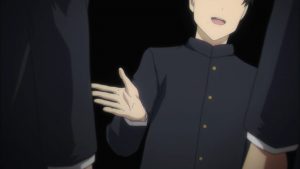 The connections can be traced all through this arc, this pair of episodes being no exception. A boy reads the novels of Kirima Seiji (Kawada Shinji) – Nagi’s dad – and is emboldened to tell the world about the strange powers he possesses, even though he knows it will lead to his death. The boy’s case brings Kirima to the attention of the Touwa organization, who send the same assassin who killed the boy after him. That would be “Mo Murder“, Sasaki Masanori (Sakaguchi Shuuhei) – who is of course the same man who killed Scarecrow. That brings the ire of Pigeon (Kakuma Ai), Scarecrow and Sasaki’s fellow artificial human, who loved Kuroda. This thirst for revenge makes her a perfect tool for Dr. Kisugi, who’c already identified Nagi as a person of interest where her proclivities are concerned.
The connections can be traced all through this arc, this pair of episodes being no exception. A boy reads the novels of Kirima Seiji (Kawada Shinji) – Nagi’s dad – and is emboldened to tell the world about the strange powers he possesses, even though he knows it will lead to his death. The boy’s case brings Kirima to the attention of the Touwa organization, who send the same assassin who killed the boy after him. That would be “Mo Murder“, Sasaki Masanori (Sakaguchi Shuuhei) – who is of course the same man who killed Scarecrow. That brings the ire of Pigeon (Kakuma Ai), Scarecrow and Sasaki’s fellow artificial human, who loved Kuroda. This thirst for revenge makes her a perfect tool for Dr. Kisugi, who’c already identified Nagi as a person of interest where her proclivities are concerned.
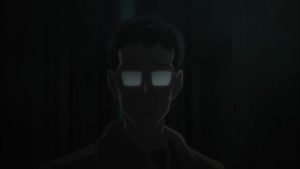 One thing that’s striking here is that Nagi has a very bad run of luck with the men in her life (though theirs is undeniably even worse). First her father, then Kuroda, and soon enough Sasaki-san – all were close to her and all were murdered. Mo Murder is no innocent, certainly – it was he that killed Scarecrow of course, and apparently dozens more like him – so perhaps there’s a certain karma in the fact that it was his getting drawn into Nagi’s game of superheroes that led to his own demise. Nagi, as it happens, was indirectly responsible for the death of both Kuroda and Sasaki – which certainly highlights the role of unintended consequences.
One thing that’s striking here is that Nagi has a very bad run of luck with the men in her life (though theirs is undeniably even worse). First her father, then Kuroda, and soon enough Sasaki-san – all were close to her and all were murdered. Mo Murder is no innocent, certainly – it was he that killed Scarecrow of course, and apparently dozens more like him – so perhaps there’s a certain karma in the fact that it was his getting drawn into Nagi’s game of superheroes that led to his own demise. Nagi, as it happens, was indirectly responsible for the death of both Kuroda and Sasaki – which certainly highlights the role of unintended consequences.
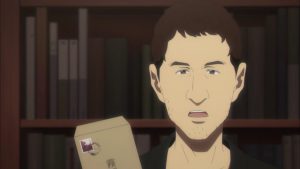 Imaginator/Minahoshi makes an appearance here too, a brief encounter with Kirima Seiji where she informs him he’s about to die which seems coincidental – except that the nature of Boogiepop suggests coincidence doesn’t really exist in this world. Or perhaps it’s all that exists? In any event the Nagi we see here still seems to be acting mainly out of boredom and a lack of direction in her life – it’s why she sets to trying to find the serial killer. Echoes suggests that Nagi does what she does because she’s carrying on the feelings of those she’s encountered (who’re all dead), which I suppose is as good an explanation as any for why she’s turned into the person she has.
Imaginator/Minahoshi makes an appearance here too, a brief encounter with Kirima Seiji where she informs him he’s about to die which seems coincidental – except that the nature of Boogiepop suggests coincidence doesn’t really exist in this world. Or perhaps it’s all that exists? In any event the Nagi we see here still seems to be acting mainly out of boredom and a lack of direction in her life – it’s why she sets to trying to find the serial killer. Echoes suggests that Nagi does what she does because she’s carrying on the feelings of those she’s encountered (who’re all dead), which I suppose is as good an explanation as any for why she’s turned into the person she has.
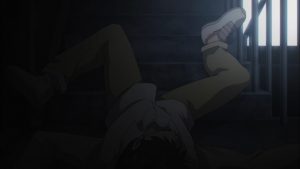 All this eventually leads us back to that initial conversation between Echoes and Boogiepop – which was indeed taking place at the end of the world (a world, at least). This whole stream of connections were related to answer Echoes’ simple question about how Boogiepop got his name – but as Echoes wistfully muses, “nothing is ever simple”. That’s the understatement of the eternity, both where Boogiepop wa Warawaranai and real life are concerned, but watching the series go about demonstrating that is proving to be a fascinating experience.
All this eventually leads us back to that initial conversation between Echoes and Boogiepop – which was indeed taking place at the end of the world (a world, at least). This whole stream of connections were related to answer Echoes’ simple question about how Boogiepop got his name – but as Echoes wistfully muses, “nothing is ever simple”. That’s the understatement of the eternity, both where Boogiepop wa Warawaranai and real life are concerned, but watching the series go about demonstrating that is proving to be a fascinating experience.


